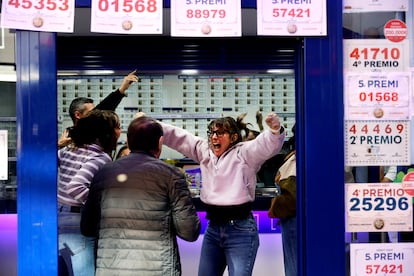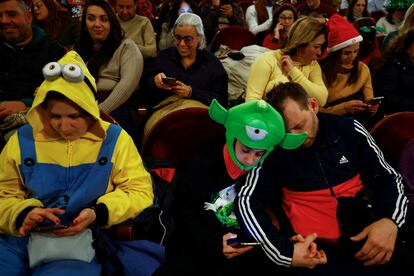Spain’s huge Christmas lottery ‘El Gordo’ showers winners with millions in prize money
The top prize went to holders of tickets with the number 88008, which was sold across the country. The immensely popular draw will hand out a total of €2.6 billion in widely distributed winnings

Lucky holders of €20 tickets with the number 88008 will be celebrating Friday. They have each won €400,000 ($440,000), or some €325,000 after tax, in the top prize of Spain’s huge Christmas lottery. Second prize went to 58303 and third to 31938.
People across the country tuned into the television, radio and internet from early morning as children from Madrid’s San Ildefonso school begin singing out the prize-winning numbers in the lottery known as “EL Gordo” (the fat one). The immensely popular lottery will distribute a total of €2.6 billion in prizes this year, much of it in small winnings. Street and bar celebrations normally break out, with winners uncorking bottles of sparkling wine and singing and dancing.
There were many winners in the southern city of Jaén, where a dance troupe called Asociación de Coros y Danzas Lola Torres had enough 88008 tickets to earn themselves $80 million. “We’re really excited because we haven’t been doing this very long and we have already sold the Gordo,” said Montse, who operates the lottery stand in Jaén that sold the number.
The winning number was called out at 1.16 p.m., the latest time on record for El Gordo’s top prize. The numbers on the winning tickets were called out by children from Madrid’s San Ildefonso school. The children picked up balls showing ticket numbers and their corresponding prizes from two giant rolling drums. They sang out both figures with a rhythmic cadence that is known to everyone in Spain. The lottery draw, which can last up to six hours, unofficially marks the beginning of the holiday season.

The event is televised nationally from Madrid’s Teatro Real opera house. When the top prize finally rang out at 1.16p.m., people dressed at the Pope, as a hot dog, as a witch, and many others sprang to their feet and started to applaud. They had been waiting over three hours inside the theater, but they had been lining up outside the building for over 16 days, in shifts, to guarantee themselves a seat.
Purchasing and sharing tickets, known in Spanish as “décimos” (tenths) in the run-up to Christmas is a major tradition among families, friends, co-workers and in bars and sports and social clubs. The prizes are not massive but there are lots of winners. And it’s common for them to know one another. Because numbers are also divided into 170 series, there are actually 1,700 décimos for every one of the 100,000 numbers. Work colleagues often buy a décimo with the same number. As do clients of the same company and members of neighborhood associations. So when a number wins, everyone wins. In other lotteries, a single winner, who almost nobody knows, is awarded millions. On December 22 however, the television cameras sent out to the lucky towns and neighborhoods that bought the winning number capture scenes of collective joy.
This element of community celebration is undoubtedly the reason why it is the most popular national lottery in Spain, especially of Christmas lotteries. It is also what encourages people to buy tickets. First to share in the fun of playing the same number as people close to you. But also so that you’re not left empty-handed if the number wins. In other lotteries, the only risk of not playing is not winning. With Spain’s Christmas lottery, there is the added risk that you will be left out of the party. That’s why lottery tickets are often shared: two or more people buy the same décimo or participación (a portion of the same ticket) so they win at least something if their number is drawn. It’s also a way of sharing the cost of playing.
Spain established its national lottery as a charity in 1763 during the reign of King Carlos III. Its objective later became to shore up state coffers. It also helps several charities. The December 22 lottery began in 1812. Since the beginning, the San Ildefonso college children have been singing the prizes.
But those who miss out on El Gordo can still win significant amounts. Second prize awards €125,000 to each winning décimo or €6,250 for every euro played. Third prize is €50,000 for a décimo or €2,500 for every euro. The Christmas lottery also includes 1,794 prizes of €1,000 for every décimo or €5 for every euro (the so-called Pedrea). Punters also have the chance to win back the cost of a décimo (the Reintegro) if the last digit of their number matches the last digit in the six-digit sequence that wins first, second or third prize.
Sign up for our weekly newsletter to get more English-language news coverage from EL PAÍS USA Edition
Tu suscripción se está usando en otro dispositivo
¿Quieres añadir otro usuario a tu suscripción?
Si continúas leyendo en este dispositivo, no se podrá leer en el otro.
FlechaTu suscripción se está usando en otro dispositivo y solo puedes acceder a EL PAÍS desde un dispositivo a la vez.
Si quieres compartir tu cuenta, cambia tu suscripción a la modalidad Premium, así podrás añadir otro usuario. Cada uno accederá con su propia cuenta de email, lo que os permitirá personalizar vuestra experiencia en EL PAÍS.
¿Tienes una suscripción de empresa? Accede aquí para contratar más cuentas.
En el caso de no saber quién está usando tu cuenta, te recomendamos cambiar tu contraseña aquí.
Si decides continuar compartiendo tu cuenta, este mensaje se mostrará en tu dispositivo y en el de la otra persona que está usando tu cuenta de forma indefinida, afectando a tu experiencia de lectura. Puedes consultar aquí los términos y condiciones de la suscripción digital.








































